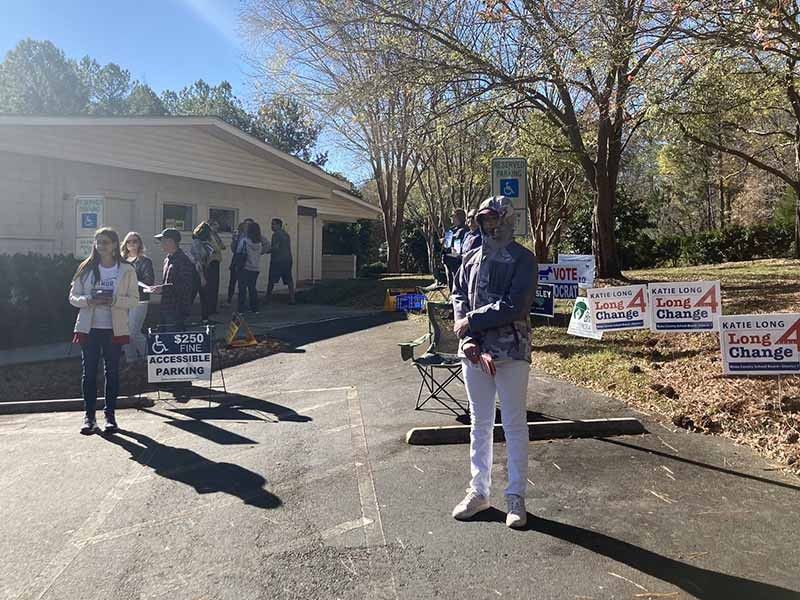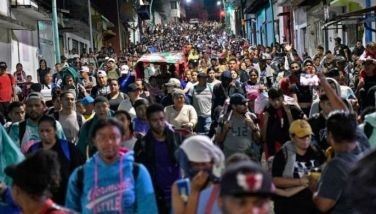Fil-Ams hope voters consider immigration, Asian hate at US midterm polls

RALEIGH, North Carolina — Filipino-American voters are hoping that key issues for them — including healthcare, immigration and anti-Asian hate crime — will also be considered by the electorate in the US midterm elections.
According to the 2022 Asian American Voter Survey by the Asian & Pacific Islander American (APIA) Vote, 87% of Filipino respondents said they plan to cast their ballots.
Filipinos in the survey identified the following as "extremely important" issues:
-
Healthcare: 66%
-
Inflation: 65%
-
Job and economy: 65%
-
Education: 62%
-
Crime: 59%
-
National Security: 55%
-
Immigration: 54%
-
Racism and racial discrimination: 51%
-
Environment: 50%
-
Voting rights: 50%
-
Gun control: 49%
-
Economic inequality: 41%
Meanwhile, Filipino-Americans noted that the US foreign policy in Asia (40%) is "very important."
RELATED: Do the US midterms matter? How results may influence foreign policy in Asia
Undocumented immigrants
As in previous US polls, immigration remains a hot issue for candidates and for voters.
"Many of our more conservative Filipinos are against undocumented aliens or illegal aliens or unauthorized aliens especially for our well-established Filipino immigrants who came here in the '80s and '90s," US Filipinos for Good Governance Washington DC Coordinator Eric Lachica told Philstar.com.
Between the two political parties, the Republicans have been doubling down on creating more stringent immigration policies and laws that would block access to the border with Mexico.
RELATED: Republicans at Arizona rally worry about election fraud, immigration
North Carolina Asian Americans Together (NCAAT) co-founder and executive director Chavi Khanna Koneru said some will take conservative stances on immigration if "they don’t know anyone personally who is undocumented."
"I remember distinctly in a local AAPI community a few years ago, there was a person who was undocumented and in danger of deportation. Suddenly his community was questioning their conservative stance because now it was their neighbor who they had known for 10 years," Koneru told Philstar.com in an interview.
"Our focus is more on educating the community about the diversity within our community."
Identifying values
Filipino respondents of the APIA Vote survey showed that 44% "generally" identify themselves as a Democrat, while 25% as Republicans, and 22% as independent. 6% of Filipino respondents said they “do not think in terms of "political parties."
Voting for the Senate race, 50% of Filipinos said they would go for Democrat candidates in their state, while 32% went for the Republicans.
Meanwhile, for the House of Representatives, 52% of Filipinos are voting for Democrats and 32% are for Republican candidates.
"It’s interesting because if you look in terms of where our interests are, it should be primarily Democratic," US Pinoys for Good Governance National president Rodel Rodis told Philstar.com.
"But a lot of Filipinos, their aspiration is to become rich, to become what they perceive Republicans to be. So their conditions might be what Democrats support but their aspirations are what they think Republicans support."
Voter turnout
Koneru noted that voter turnout for midterm elections is historically lower than the turnout for presidential elections.
"That means that each vote carries more weight in the midterms," she said. "Each vote matters exponentially more in toss-up races where the margins of victory are razor thin."
Koneru noted how in North Carolina the Filipino community's population of more than 20,000 may even be "enough to change the outcome of toss-up elections."
However, Greg Winger, professor at the University of Cincinnati’s School of International and Public Affairs, said he expects a higher than usual voter turnout for the midterms.
"I do think people still have value in voting, people who’ve cast the vote are confident their vote will be counted," Winger told Philstar.com in an interview.
"I think where the election now becomes dangerous is what happens when the candidate who didn’t vote for win then, do you accept the votes?"
READ: 'Election denialism' stalks US midterm polls, puts democracies abroad at risk
--
This story was made possible through the International Reporting Tour hosted by the US Department of State's Foreign Press Center.
- Latest
- Trending



































